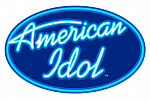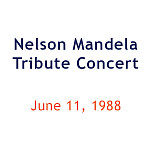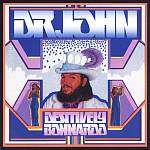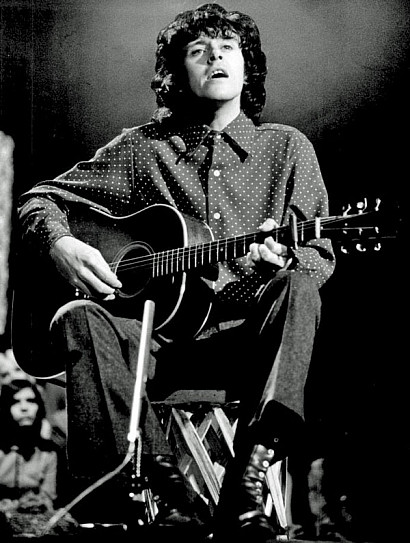11 JUNE
Featured Events
2016 22-year-old Christina Grimmie, known for placing third on Season 6 of The Voice, is killed when gunman Kevin James Loibl opens fire at a meet-and-greet at The Plaza Live theater in Orlando, Florida. The singer's brother, Marcus Grimmie, tackles Loibl, who fatally shoots himself during the scuffle.
2004 Faith Hill makes her film debut in the comedic remake of the 1975 thriller The Stepford Wives. Nicole Kidman, Matthew Broderick, and Bette Midler also star.
2002 Paul McCartney marries former model Heather Mills in Glaslough, Ireland. Among the guests: Elton John, David Gilmour, Chrissie Hynde and Ringo Starr. The couple divorces in 2008.
 2002 American Idol premieres on the FOX network. A singing competition judged by three hosts, it becomes one of the most popular network reality shows and launches a number of careers, with many contestants - and not just winners - becoming stars.More
2002 American Idol premieres on the FOX network. A singing competition judged by three hosts, it becomes one of the most popular network reality shows and launches a number of careers, with many contestants - and not just winners - becoming stars.More
 1988 Dozens of big-name acts, including Peter Gabriel, Sting, Whitney Houston and Stevie Wonder, rock the stage at the Free Nelson Mandela Concert at Wembley Stadium in London.More
1988 Dozens of big-name acts, including Peter Gabriel, Sting, Whitney Houston and Stevie Wonder, rock the stage at the Free Nelson Mandela Concert at Wembley Stadium in London.More
1986 Ferris Bueller's Day Off his theaters. When Matthew Broderick leads a parade through downtown Chicago to The Beatles "Twist And Shout," it renews interest in the group, and the song soon returns to the charts.
1969 Glen Campbell stars opposite John Wayne in the movie True Grit. His role of Texas Ranger La Boeuf is played by Matt Damon in the 2010 remake.
1968 During a recording session while The Rolling Stones are working on "Sympathy For The Devil," a fire breaks out in the studio. While many are quick to blame Lucifer, the blaze is actually caused by a light being used by a camera crew documenting the sessions.
11 JUNE
In Music History
2020 Country trio Lady Antebellum change their name to Lady A to avoid connotations with slavery. "Antebellum" refers to the period before the Civil War in America; the band name referred to the architectural style of Southern homes built during this period.
 2011 Bonnaroo celebrates its 10th anniversary by hosting a performance of Dr. John's Desitively Bonnaroo, the 1974 album that inspired the festival's name. The performance reunites the New Orleans R&B veteran with the album's producer, Allen Toussaint, and legendary backing band The Meters.
More
2011 Bonnaroo celebrates its 10th anniversary by hosting a performance of Dr. John's Desitively Bonnaroo, the 1974 album that inspired the festival's name. The performance reunites the New Orleans R&B veteran with the album's producer, Allen Toussaint, and legendary backing band The Meters.
More
2011 Jessie J ruptures tendons in her foot while rehearsing for the Capital Radio Summertime Ball. She does her set the next day from a throne; 13 days later she would perform a seated set once again at the Glastonbury Festival.
2011 Lily Allen marries the decorator Sam Cooper in Gloucestershire, England.
2008 Nancy Sinatra appears before the US Congress pleading for legislation that would require all performers, not just songwriters, to get paid for songs played on commercial analog radio.
2000 Busta Rhymes rides atop his own float in the National Puerto Rican Day Parade in New York. "I'm here to thoroughly represent the entire spectrum of the urban community," Rhymes says.
1992 U2 invites ABBA's Bjorn Ulvaeus and Benny Andersson to join them onstage at their concert in Stockholm for a rendition of ABBA's 1976 smash "Dancing Queen."
1991 Skid Row release the album Slave To The Grind, the follow-up to their 5-million-selling self-titled debut. It debuts at #1 in America and sells 2 million, but it doesn't have legs: none of the songs catch on with radio or MTV.
1991 Lynyrd Skynyrd return to recording with Lynyrd Skynyrd 1991. It's their sixth album, following Street Surviors, but is their first since the plane wreak take took three band-members lives in 1977. The new lineup initially uses the name "Lynyrd Skynyrd 1991," but eventually has to drop this name after the media and fans essentially ignore it and continue to call them Lynyrd Skynyrd.
1990 The United Nations appoints Olivia Newton-John its first Goodwill Ambassador to the environment. At first, she uses her position to encourage recycling and avoid chemicals harmful to animals, but later takes a more forceful and controversial stand in opposing fracking, which puts her at odds with the Australian mining industry.
1982 After much anticipation Grease 2, the sequel to the smash 1978 musical, lands in theaters... but crashes and burns.More
1977 KC and the Sunshine Band's "I'm Your Boogie Man" hits #1 in America.
1976 Wild Cherry release "Play That Funky Music."
1976 The Carpenters release A Kind Of Hush.
1971 A drunken Dennis Wilson, drummer for The Beach Boys, accidentally puts his hand through the glass door of his home, severing nerves that keep him from his instrument for the better part of three years.
Donovan Busted In First Of Many Rocker Arrests In London
 1966
1966Donovan becomes the first rock star busted for drugs by the newly vigilant London drug squad.
Bolstered by the Dangerous Drugs Act of 1965 and public hysteria over the rising drug culture, police, led by the law-and-order officer Norman Pilcher, stake out Donovan's flat on Edgware Road, where he hosts lots of bohemian gatherings. He's an easy target: the 20-year-old singer broadcast his drug habits on his 1965 track "Sunny Goodge Street" (where he sings about a "hash-smoker") and in the documentary A Boy Called Donovan, where it's clear he likes to indulge and someone in his ambit is seen smoking pot. Police have no trouble nabbing him by using a plain-clothed policewoman to pose as a party goer, who knocks at the door at 1:30 a.m. Donovan's roommate Gypsy Dave lets her in, but she's followed by nine cops who search the place, finding enough hashish to arrest Dave, Donovan, and Donovan's girlfriend. With help from a lawyer supplied by his good friends George Harrison and Paul McCartney, Donovan avoids jail time but is fined £250 and admonished in court. The arrest is part of Pilcher's strategy of going after rockers for maximum media attention and to prove that nobody is above the law when it comes to drug enforcement. Over the next few years, he leads successful but legally dubious operations against members of The Beatles and The Rolling Stones. It seems vengeful, but Pilcher insists it's just business. He has a habit of asking for autographs once his victims are in custody.
Categories
©2024 Songfacts®, LLC

Comments
send your comment